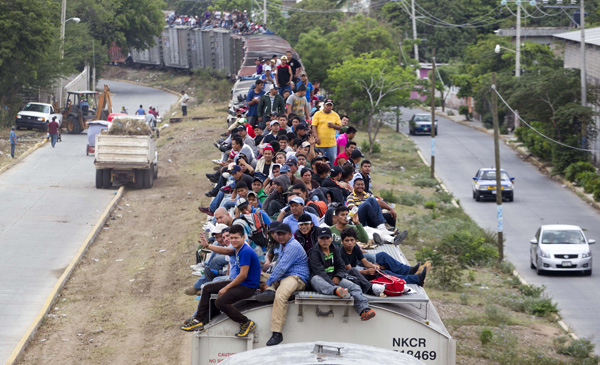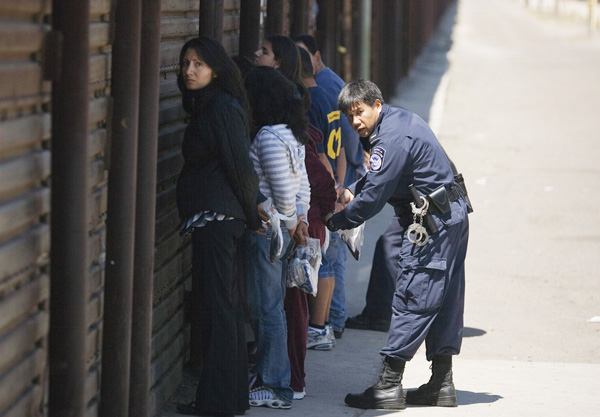High School Students Speak Out About Mass Deportations: "It's unfair, it's not right... it's wrong"
April 14, 2014 | Revolution Newspaper | revcom.us
A Revolution correspondent interviewed three high school students at the April 5 “Not1More Deportation” rally at LA City Hall. What follows are excerpts.
Alex: I’m from LA, near Hollywood. I’m out here for the first time. We were discussing civil disobedience in class, and we thought it would be a good experience to come down to a rally and experience it first hand.
Also down here is a friend of mine; his parents were deported three years ago so we’re here in support.
Juan: It was around 9th grade when my mom and my dad got deported, because of a violation, a ticket. They just took them away. My mom had a ticket, a traffic ticket. While she was in the car, when they saw her they took her away. She called me from jail telling me they were going to send her away. Then my dad called me three months later. He started driving the car. And for the same reason, they got him, and they took him away as well.
So my sister, who was 17 and I was 14, she didn’t have a job, so she had to quit college... she gave up all her studies just to go work. And since then she’s been working at the same job and helping support me and my little brother. We stay in a small little studio apartment, the three of us. I don’t know the city where my parents are, but they’re both in Mexico. They’re originally from Sinaloa. They told me they went somewhere else because right there, right now, it’s dangerous—the cartels, and all the drug trafficking and all.
I feel like I don’t want nobody to go through the same thing, especially if they’re young. Really, separating families is something horrible, because not only do you lose your parents, but you also lose your train of thought... It’s not a good experience to go through, and I’m here to stop it.
Revolution: How do you feel about the demand “Not 1 More Deportation”?
Juan: That’s good because I know we’re not the only ones trying to stop it, it’s all around the world; and sooner or later they’re going to have to hear from us, because that’s what the Constitution is, it’s for the people...
Revolution: Are they taking it up in school?
Juan: Yeah, in our English class, it’s our topic, they’re taking it up everywhere. Our teacher told every one of his students to come here, and to protest. So there’s some classmates here right now.
Alex: Yeah, I’m here also because I had my grandfather... about four years ago, he was a construction worker, so he was working, I guess. They were missing a certain piece of his paperwork. They looked into it and saw that he was undocumented, so my grandma calls me one day in the middle of the night telling me that my grandfather was taken from the house and that he was deported. Right now he’s living in Lima, Peru, where he’s originally from.
He came when he was maybe 16, and it took them this long to finally notice. But even then, the fact that he’d been here this long, I don’t know why it should matter. He’s 67. I obviously see it as unfair. Right now we’re going through lawyers, to see if we can get him back here; because where he is now, he gave up everything over there, for a chance here, he was doing fine. And now that he’s gone back he has nothing left to go to, so he’s barely able to keep himself together.
Third student: I’m showing support for the same reason as them... My cousins, they were here already, they got separated from my aunt when they were younger... She was deported to Honduras, she’s not really from Mexico. So the effect’s the same. And I’ve always been a big part of trying to stop the separation of families... Obama should change his tune—it doesn’t seem as though he really wants to.

2013. People ride on top of a northern bound train toward the US-Mexico border in Union Hidalgo in Oaxaca, Mexico.
Photo: AP
Alex: Six years ago, my mother’s fiancé came to the U.S., looking for opportunities because he had family here. So coming here was, just whatever he had in his backpack, and the clothes on his back. He found a way to make a living. He found a spot with a welding company... He told this story, one day, that on his way here, he came with friends, but they were separated because people were being checked on top of buses and trains, of how they were arriving here. They were coming from Honduras. He was halfway through El Salvador when they were checking on top of trains, and they had to run. So they separated, his backpack gone, having nothing, somehow found his way here. He went into hiding for a while, and as soon as he saw the train going he got back on the train. He said that there were hundreds of people, mainly mothers with kids, traveling here, on the tops of the trains, finding any way they could to get here, to the U.S. And there were certain checkpoints where people were being stopped and asked if they even had papers in general. He said 70 percent or 80 percent did not make it. He was one of the lucky 20 percent or so who made it here to the U.S. He said he seen people being dragged away, taken away, in vans, taken back to certain detention, where they’re kept....
I was born here, so I really don’t know what it’s like to be separated from your family, at a very early age; having to run, just to have an opportunity here. It’s very, very sad, it’s devastating, to see what people go through just to have an opportunity here. And having to see that Obama has to deport all these people, and it’s unfair, it’s not right. Honestly, it’s wrong. It’s wrong... In today’s world, Obama has to be open-minded to the fact that immigrants come here for a reason—come here for jobs, opportunities, for a better life. There’s a reason they escape from where they’re coming from. And for him just to send them back, it’s just wrong....
I always ask myself, to what extent do we have to go in order for Obama to get the message, that we’re here for a reason, we’re here to raise our voices to this cause?... They can’t ignore it for long. We’re not going anywhere. We’re gonna be here. You get rid of a thousand, there’s gonna be another thousand to replace them. It’s a movement that’s not going to stop. Our numbers are vast, we’re large....
I go to church every Sunday, with my mom. I pass skid row every Sunday. I don’t like to see that—hundreds, maybe more, of African-Americans line the streets, given the worst that could possibly be given anybody.... Honestly I don’t see how that’s fair to anyone. We pass by it like nothing is there. It’s wrong. My mom works for a company, one of the main contributors has a son who created a foundation where he helps give back to those people. That is a good example of what we should be doing—helping those who have nothing, or maybe even less than nothing. I’ve been living in this city since I was three. Never, ever, have I seen anybody, an official, anybody in LA, as far as the president, do anything about it. Personally I’m trying to start a foundation of charity where I could help raise money for them, for the people who are down there, barely able to survive. This city has very extreme weather, very extreme things. And for them to endure it with nothing to help them, no one to guide them, no way to defend themselves is very, very terrifying; it’s very sad.
I have a film class, where I go to now, so I decided to do a short five-minute film where I interviewed a family there. I was interviewing an older man, his wife, and his 21-year-old daughter, who is currently attending, if I am correct, USC. She’s working, living on the street, but she still goes to school. And she tells me how hard it is to see that her parents, who gave her everything, who have given up more than they had to put her through school. I was interviewing them, and they told me how hard it is. They’ve gone through almost two winters now, having to spend their time there. The shelters that are built around, they can’t fit everyone there. So not everyone gets... even so much as a blanket, proper clothes to keep them warm. I’ve seen people get sick over the terrible conditions that have put them on the street in the first place....
For the first two years of my life, my father was not around—I lived in a border town. I had nothing for the first two years of my life. I was living in a car with my mom. My aunt found us there, gave me a proper home, put clothes on my back. I thought I had it rough until I started coming to church and seen what they had. These people have been living there for years. And they’re still stuck in the very same place that they’ve been for the past three or four years or more. I don’t see how you could profit off of this and not feel guilty about it.
Volunteers Needed... for revcom.us and Revolution
If you like this article, subscribe, donate to and sustain Revolution newspaper.

